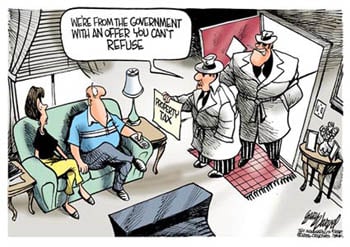 es·crow (ěs’krō’, ě-skrō’)
es·crow (ěs’krō’, ě-skrō’)
n. Money, property, a deed, or a bond put into the custody of a third party for delivery to a grantee only after the fulfillment of the conditions specified.
First of all, what are escrow impounds and why should you care? Escrow impounds (often just called ‘escrows’ or ‘impounds’) are fees collected by the lender at closing and then each month in order to pay third party bills on your behalf. Lenders do this to ensure important bills are paid and to help budget for these payments because they are due in lump sums which are often quite large. The homeowner pays these fees each month and the bank holds them in a separate ‘escrow’ account and pays the bills when due.
Typically, for single family homes, the impounds cover the insurance and property tax bills. For condos, insurance costs are paid by the condo association and the condo fees are paid monthly by the homeowner to the condo association, so impounds solely cover property taxes.
Taxes are typically due twice a year, while insurance is paid annually. The lender does not charge for this service and often requires it. For all government insured loan programs (FHA, VA and USDA), impounds are required. For conventional loans, many lenders require it and will charge a fee of 0.25% if a borrower wants to manage these payments on their own. For a $400,000 loan that becomes a cost of $1000.
Escrow Impounds vs. Escrow Fee
It’s important not to confuse this with the “Escrow Fee” associated with a loan transaction itself. That fee is charged by the escrow company for their services during the transaction. It is also a VA Non-allowable fee which means that a veteran is not allowed to pay that fee. However, all FHA, VA, USDA borrowers must pay the impound fees at closing and each month thereafter.
Budgeting for Escrow Impounds
Escrow impounds become very important when you are budgeting for the purchase of a new home. For a single family home, one full year of hazard insurance (fire, hurricane, flood, etc…) is due at closing and an additional three months are collected to establish reserves for the next year’s payment. Depending upon the size and location of your house that amount can be anywhere from $750 to $2000 or more at closing.
Regardless of the type of home you are buying, property taxes must always be paid. In most counties, taxes are paid in two installments. So, depending upon what month you are closing, you may have to prepay anywhere from three to eight months of taxes at closing to the lender. In addition, you must reimburse the seller for the taxes he/she has already paid on the property for the upcoming months. In Honolulu, taxes are collected in mid-August and mid-February. For example, if you close in April, the seller had already paid the taxes due in February and covering through August. You will reimburse the seller for May, June and July because he/she has already prepaid, but you will be living there.
All-in-all, you will always need to come in with approximately nine months of taxes at closing (Below is a chart to illustrate this). When purchasing a Single Family Home, make sure to also budget for the 15 months of Hazard insurance due at closing. Good luck with your future home purchase and feel free call us with any questions or concerns you may have

